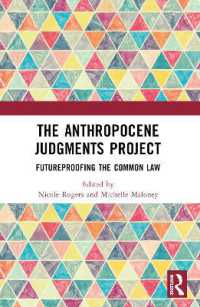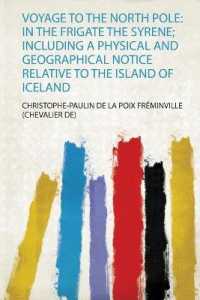- ホーム
- > 洋書
- > 英文書
- > Literary Criticism
Full Description
"Iberianism" refers to a minority intellectual current which emerged in Spain and Portugal during the mid-nineteenth century and developed in step with the Iberian Peninsula's successive crises. Iberianism sought to upend the peninsula's political and intellectual status quo by advocating closer ties between the two peninsular kingdoms, and more equitable relations between the Spanish state's constituent regions, including Castile, Catalonia, Basque Country, and Galicia.
Robert Patrick Newcomb's Iberianism and Crisis examines how prominent peninsular essay writers and public intellectuals, active around the turn of the twentieth century, looked to Iberianism to address a succession of political, economic, and social crises that shook the Spanish and Portuguese states to their foundations. Bringing into dialogue prominent fin-de-siècle peninsular literary intellectuals, including Joan Maragall, Oliveira Martins, Emilia Pardo Bazán, Antero de Quental, and Miguel de Unamuno, Newcomb engages in a comparative analysis of textual sources across national and regional borders, languages, and literary canons.
Contents
Chapter 1
Iberianism in a Time of Crisis
Discourses of Crisis in Fin-de-Siècle Spain and Portugal
Iberianism as a Response to Peninsular Crisis
Iberianism as Critical History
Chapter 2
Antero de Quental, Iberista: A Portuguese Iberianist, the Geração de 70, and the Sexenio Democrático in Spain
Antero de Quental, Iberian Federalist: Portugal Perante a Revolução de Espanha
Causas da Decadência dos Povos Peninsulares as an Iberianist Text
The Afterlife of Iberianism in Antero de Quental
Chapter 3
"A Ribbon of Silver": Representations of the Portuguese-Galician Border at the Fin de Siècle
Oliveira Martins: Dismembering Galicia
Emilia Pardo Bazán: Invincible Affinity
Miguel de Unamuno: Galician Nature and the Iberian Dialectic
Chapter 4
Miguel de Unamuno: A Peninsula of Flesh and Bone
Miguel de Unamuno, Lusófilo and Iberianist
Iberia as a Dialectical Unity
Portugal and Spain, Flesh and Bone
Dialectical Unity, Corporeal Ties
Chapter 5
Joan Maragall: Iberian Hymns from Catalonia
The Prismatic Man: Maragall as Catalan, Spaniard, and Iberian
Maragall's Fragmentary Iberianism
Maragall and Unamuno in Dialogue: Europeanization and "Another Spain"
Chapter 6
The Iberianist Legacy: Salvador de Madariaga reads Oliveira Martins
Salvador de Madariaga: Iberian Federalist and Liberal Heretic
Madariaga and the Publication of A History of Iberian Civilization
Iberian Unity and Variety: Madariaga and Oliveira Martins Compared
Conclusion
Iberianism's Lessons
From Hispanism to Iberian Studies
Iberian Studies and the Shadow of Iberianism
Works Cited







